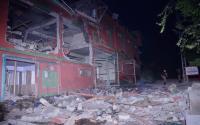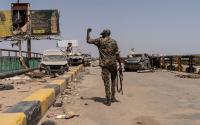Guardian,Tuesday October 2, 2001
George Bush once said that the biggest mistake of his life came when he owned the Texas Rangers baseball club and got rid of a player called Sammy Sosa, who became one of the great home-run hitters of all time.
Like much else we used to know about American politics, that is presumably out of date by now, along with the joke that Dubya thinks Al Qaida is some guy who plays short-stop for the Detroit Tigers. I have this odd feeling that the president's biggest mistake might turn out, as so often happens, to be what everyone now perceives to be his biggest triumph.
The pace of events being what it is, it's possible that by the time you read this, half a dozen SAS men or SEALs will have abseiled down a mountainside, headed into the cavern like Bilbo chasing Smaug the Dragon, captured Bin Laden and carried his head away on a platter. And if the best comes to the best, the notion of Dubya being in power until 2009, when his image will be carved into Mount Rushmore and brother Jeb moves into the White House, would be a small price to pay for getting shot of his fiendish enemy.
The first problem, though, as attorney-general John Ashcroft has been trying to say, is that the capture of Bin Laden might only increase the danger to American civilians, rather than reduce it. And what if it isn't so simple?
For more than a week now, all the propaganda from the administration has been designed to cool the war fever that raged across America after the attack. The danger that the US might lash out at anyone and everyone has abated. The message now is all about subtlety. This, we are told, will be a new kind of war, a concept that sounds dangerously like the new economy, the internet-led one that was to erase forever the outmoded cycle of boom-and-bust.
Sometimes we will be told what's going on; sometimes - presumably when it's bad news - we won't. The American people, accustomed to wanting giant-sized blue raspberry-flavour Slush Puppies with swirls of chocolate topping, ranch dressing and cheese melts, and wanting them NOW, suddenly understand the need for patience. So the polls say, the ones that report 90% backing for the president.
Well, maybe. The kind of person smart enough to read all the way through the news section of the Washington Post (I know one of them; there may be a second) might indeed have this sort of patience. I am not sure about the rest of the nation. There is a long-standing tendency for voters to make all kinds of virtuous statements to pollsters - a preference for good works rather than tax cuts, for instance - on which they renege at the crucial moment.
The problem in this case is that they were already worked up into a state of excitement about imminent retribution. The person who worked them up was the president, in the famous speech to Congress that earned enough standing ovations to make a dictator blush.
This phoney-war period is doubtless deeply misleading in many respects; in October 1939 it would have been impossible to grasp the nature of what lay ahead. Defeatism is as dangerous as over-confidence. But I am finding it hard to get out of my head one letter, written just after the speech to the New York Times by Catherine Kudlick, a Californian history professor.
She rightly gave Bush credit for the effectiveness of his rhetoric and for telling the country it would be a messy, drawn-out conflict. "But in promising a new kind of war, he tempts us with an old image of victory that may be impossible to achieve," she wrote.
"What could possibly convince us that the last bomb has been planted, the last gas canister spent, the last computer virus launched? Six months without an attack? Six years? Six centuries?"
It is this thought that alarms me more than anything, as the strategists contemplate the snowfall statistics in the Hindu Kush, and the difficulties of using a sledgehammer to crack a wasp's nest. I am not sure Americans are truly ready for the realities of the battle that has now been joined. I am not sure any of us are.
• Having been closed for refurbishment, this column has now reopened, after being moved brick by brick across the Atlantic, like the old London Bridge - though more temporarily. The idea, when I wandered tentatively into the Guardian's Washington bureau on the morning of September 10, was that this space might reflect not just the problems of global trauma but the general lunacies and lovability of American life. I hope, profoundly, that we will still be able to do just that.






